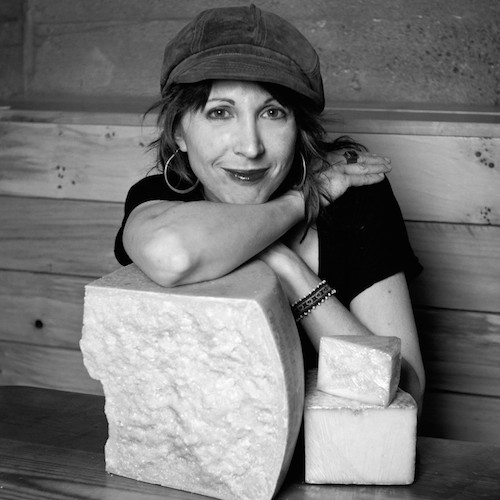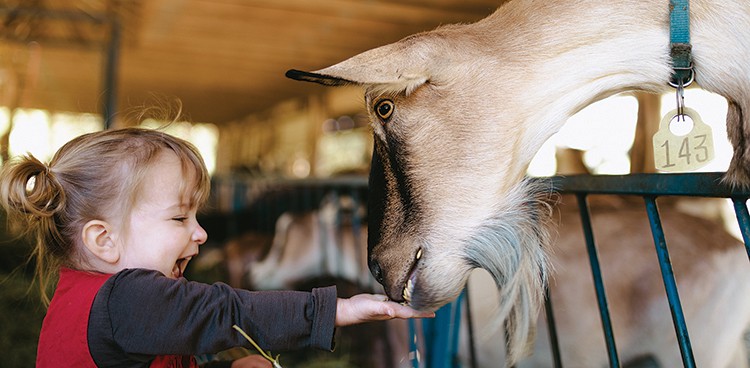
As Luck Would Have It is featured in our Spring 2017 issue.
It’s a humid, overcast day in the Texas Hill Country, roughly 30 miles west of Austin. The undulating landscape is dotted with juniper and oak trees, limestone outcrops, and native grasses. It’s surprisingly lush in spring, which makes the goats of Pure Luck Farm and Dairy happy, indeed.
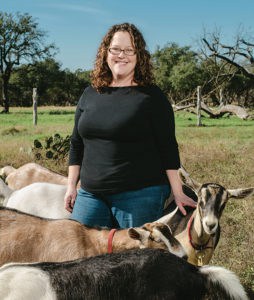
Second-generation cheesemaker Amelia Sweethardt with a few of her employees.
The 100 ruminants—Nubians, Alpines, and crosses—that supply the milk for Pure Luck’s farmstead cheeses aren’t just in a good mood due to widespread forage. Cheesemaker, director of operations, and herd manager Amelia Sweethardt, her husband and general manager, Ben Guyton, her sister Claire Bolton, and four full-time employees ensure that every animal is treated like family from birth.
When Sweethardt and I enter the pasture, the goats move as one across the enclosure and within seconds we’re surrounded. Sweethardt steps away, leaving me in the eye of the swarm, where I’m nuzzled and nibbled with great affection. It’s not unusual caprine behavior, but even after a lifetime raising and working with dairy goats, I’m surprised by the herd’s special bond with humans.
“I enjoy the relationship that develops from bottle-feeding the kids,” Sweethardt says. She began making cheese in 1997, and acquired the family business in 2005 after her mother and Pure Luck founder, Sara Sweetser, passed away. “Even though my sisters [Gitana, Claire, and Hope] and I grew up milking and working on the farm, I was the only one with cheesemaking and operations experience,” Sweethardt says. “Given that the farm’s future depended on that, it was an easy choice to step into my mom’s role and carry on what she started.”
Creating a Chèvre Legacy
What Sweetser started was one of the Lone Star State’s first certified-organic farms. In 1979, the single mother of two purchased an 11-acre, 1930s tomato farm on Barton Creek, just outside of Dripping Springs. In 1983, Sweetser met Denny Bolton, a plant-nursery worker, landscaper, and organic gardener; the couple married and had two daughters together. What began as a labor of love and a subsistence enterprise quickly became a thriving, family-owned and operated wholesale produce business growing cucumbers, culinary herbs, and cut flowers (today, the farm solely sells herbs).
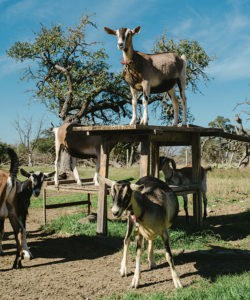
A few of the Pure Luck ladies.
Sweetser fell hard for goats; a stint looking after a friend’s small herd in 1981 inspired her to purchase her own animals and try her hand at cheesemaking. She built a milking parlor and creamery with the intention of bringing her chèvre to market—a dream that came true in 1995 when she received her Grade A dairy license.
“She was in the right place at the right time, but she was also uncompromising about quality and following regulations,” Sweethardt says of her mother.
Pure Luck has been a family affair from the get-go—Denny pitched in with sales (though he’s now retired and a writer) and Sweethardt’s sisters have all, at one time or another, been involved in the company. Claire continues to help manage the herd and also makes cheese. (“She has an amazing capacity for taste and smell,” Sweethardt says of her sister. “She’s so observant.”)
The creamery’s offerings—all of which are pasteurized and made with microbial rennet—first took home awards from the American Cheese Society Judging & Competition in 1998. “That’s when Mom really felt like she’d broken through in the industry,” Sweethardt says. The clean flavor and exceptionally light texture of the cheeses have also made fans of Texas’ most acclaimed chefs and restaurants, including Austin’s Emmer & Rye, Barley Swine, and Olamaie.
Good Investments
Ranching and farming have always been important in the Hill Country. A geographically diverse region of karsts, deep creeks, and prairies comprising 31,000 square miles, it was settled in the mid-1800s by German immigrants and homesteaders from the Ozarks and Appalachians. Despite its proximity to the Pedernales River, the Dripping Springs area has never been suited to cow dairying because the soil is thin and rocky, and there’s little rainfall. It’s a wonderful place for raising goats, however. “They’re browsers rather than grazers, and the outcrops are ideal goat habitat,” Sweethardt explains.
Three livestock dogs—a Turkish Kangal, an Akbash, and a Great Pyrenees—guard the farm’s goats from coyotes. The animals feed on pasture and supplemental alfalfa hay, and twice a day they troop into the small milking parlor. The milk is pumped directly into the bulk tank, then transformed into delicate, basket-molded chèvre, sold plain or flavored variously with red Anaheim chilies, cracked black pepper, and mixed herbs. There’s also feta, the beguiling June’s Joy (fresh cheese blended with local Round Rock wildflower honey), and ash-coated Sainte Maure logs.
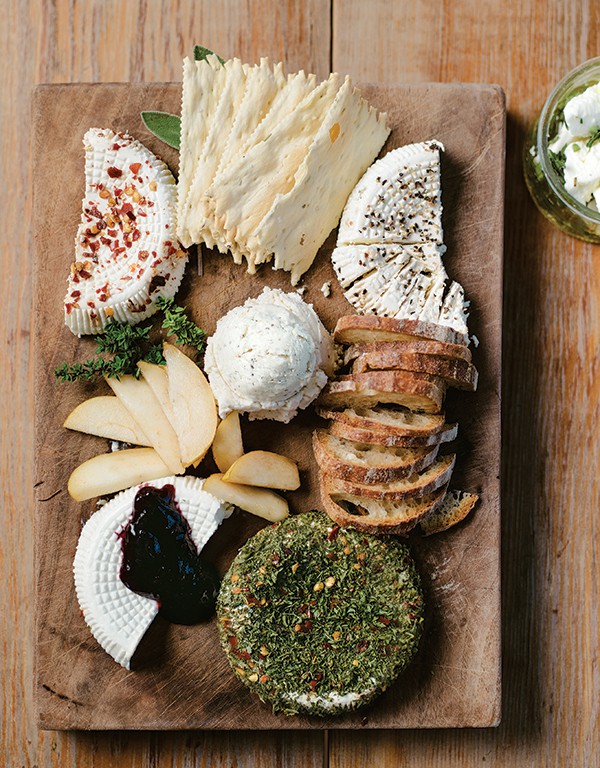
A sampling of the dairy’s cheeses. Clockwise from top left: Anaheim Red Chili Chevre, Cracked Black Pepper Chevre, Feta, Mixed Herb Chevre, Plain Chevre, and June’s Joy.
When Sweethardt took over cheesemaking in 2005, she tweaked and refined all of the cheeses originally developed by her mother, with an eye toward consistency. Although the myriad chèvres are Pure Luck’s “bread and butter,” Sweethardt says, aged cheeses provide income during winter months. Hopelessly Bleu, for one, ripens eight to 12 weeks. The petite wheel—named for Sweethardt’s sister, Hope Bolton, who famously dislikes blues—has an appealing ivory paste with notes of cream and salt. It has won multiple awards at the American Cheese Society Judging & Competition, and now is one of the dairy’s best-selling products. “If you’re going to spend the time and money aging cheese in your creamery, it better be good,” Sweethardt says.
While she can still be found in the make room most days, Sweethardt promoted employee Olivia Gonzalez to creamery manager in 2013. “I’m like the head chef and she’s the sous chef,” she says, with a laugh. Gonzalez and her husband, Juan Cruz—the former herd manager, he now oversees the herb farm with his brother, Trini—have been working at Pure Luck for more than 16 years. “You’ve got to invest in your people, and be able to delegate,” Sweethardt says. “This is their only job, and even in winter there’s plenty to do. We plan it that way, so we can pay them year-round.”
The creamery—replete with a 160-gallon pasteurizer that dominates the 288-square-foot make room—operates seven days a week. “Although we remodeled the plant last year,” Sweethardt remarks, “we didn’t change the functionality—it’s always been designed so that one person can do everything herself, from draining vats to flipping molds.” During peak season from April to August, Pure Luck produces 600 pounds of cheese a week by hand.
Making Connections
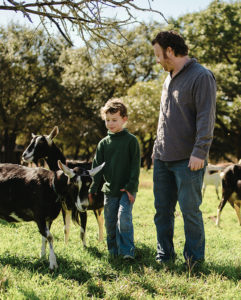
Sweethardt’s husband, Ben, and their son, June, visit the pasture.
With all that hard labor to be done, Sweethardt and Guyton strive for efficiency and work-life balance. (The couple has two children—son, June, 8, and daughter, Sara, 3, both help out in the barn.) They stagger goat breeding so that the babies aren’t all born around the same time, which also ensures a year-round milk supply. “I think it’s a lifestyle choice,” Sweethardt says. “It has to work for your family, or it doesn’t work.”Goat breeding fascinates her. “I’m passionate about the genetic variants in dairy goats and how that affects cheesemaking,” Sweethardt says. Last summer, Pure Luck introduced AI (artificial insemination) into its live breeding program, primarily to select for genetics that carry high levels of alpha s1 casein, one of the main proteins responsible for curd formation in goat’s milk.
With Pure Luck’s thriving herd and products established at Antonelli’s Cheese Shop, Houston Dairymaids, Central Market, and other renowned Texas cheese counters, the team is close to achieving a longtime goal: opening a farm store. A renovated mid-century cottage, relocated from Austin, will house a small retail shop (offering made-to-order cheese plates and picnic baskets to go), classroom, and teaching kitchen. Though Pure Luck has always held cheesemaking classes and tours by appointment, the expansion facilitates new ways to connect—and reconnect—with customers.
“When we started, we sold our cheese out of a walk-in cooler down by the road,” Sweethardt recalls. “It was a self-serve honor system most of the time. Neighbors and city folks with weekend homes in the Hill Country would drop by—it was kind of like their own private shop.” When that became too difficult to manage with the day-to-day workload, the family shuttered the operation amid “serious backlash and some tears,” Sweethardt says. “Opening to the public and enabling our customers to once again purchase cheese directly from the farm is about getting back to our roots.”
And those roots run deep. Unlike the offspring of many agriculturalists, Sweethardt has never had the desire to leave farm life behind (despite brief stints working in tech and traveling in Mexico in her early twenties). She is, after all, her mother’s daughter, and shares Sweetser’s intense connection to the earth and the region.
“I’ve always wanted to literally see the sun rise and set each day, and experience the natural fluctuations and changes that occur in between—as a farmer, you see, smell, and touch it all,” she says. “I’m surrounded by my lifestyle and that’s the way I like it.”


